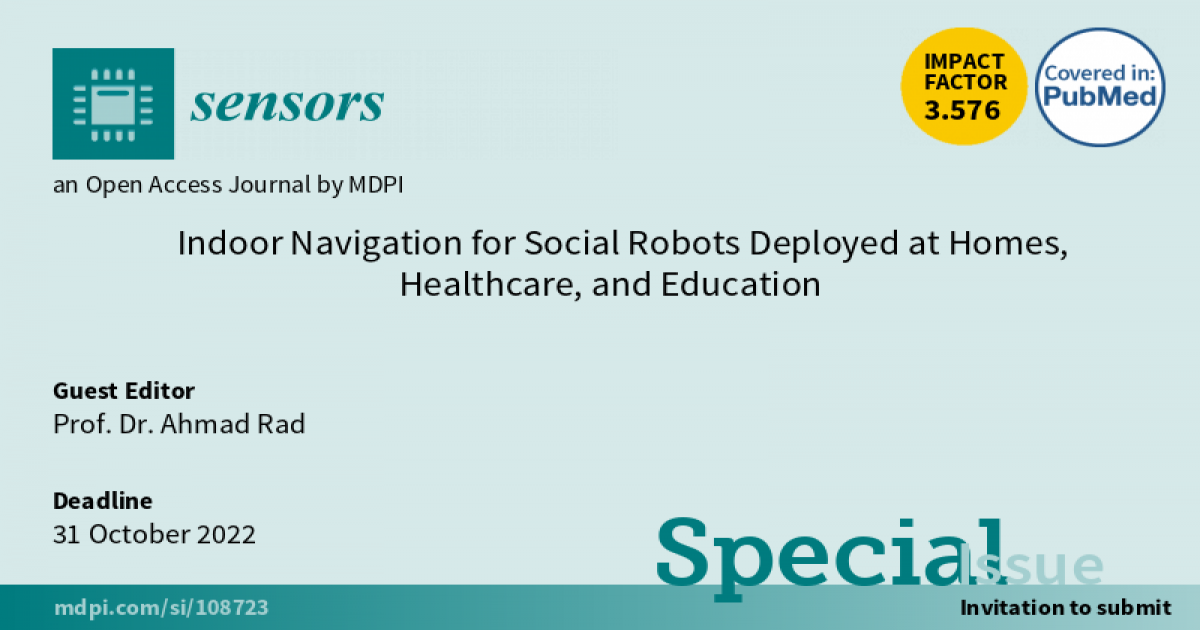Indoor Navigation for Social Robots Deployed at Homes, Healthcare, and Education
A special issue of Sensors (ISSN 1424-8220). This special issue belongs to the section "Sensors and Robotics".
Deadline for manuscript submissions: closed (31 October 2022) | Viewed by 6809

Special Issue Editor
Interests: social robots; autonomous systems; multi-modal perception; simultaneous localization and mapping; indoor navigation
Special Issues, Collections and Topics in MDPI journals
Special Issue Information
Dear Colleagues,
Social Robots are expected to play an important role in years to come, becoming a part of our homes, hospitals, libraries, etc. They will provide companionship, cooking, cleaning, caregiver, among other services. These intelligent robots are also expected to play important roles in healthcare and education, and can provide a helping hand in the face of the current pandemic.
Among various functionalities, navigation is regarded as a central attribute. These robots should be able to move seamlessly around an indoor setting in order to complete different tasks.
This Special Issue on social robotics is aimed at academic and industrial researchers who are applying new methods to solve challenges in the field. The key areas of this Special Issue include (but are not limited to):
- Indoor robot localization and mapping;
- Robot awareness;
- Robot cooperation;
- Rehabilitation robots;
- Place recognition;
- Biologically inspired robotics;
- Smart home technologies;
- Smart living;
- Smart sensors.
Prof. Dr. Ahmad Rad
Guest Editor
Manuscript Submission Information
Manuscripts should be submitted online at www.mdpi.com by registering and logging in to this website. Once you are registered, click here to go to the submission form. Manuscripts can be submitted until the deadline. All submissions that pass pre-check are peer-reviewed. Accepted papers will be published continuously in the journal (as soon as accepted) and will be listed together on the special issue website. Research articles, review articles as well as short communications are invited. For planned papers, a title and short abstract (about 250 words) can be sent to the Editorial Office for assessment.
Submitted manuscripts should not have been published previously, nor be under consideration for publication elsewhere (except conference proceedings papers). All manuscripts are thoroughly refereed through a single-blind peer-review process. A guide for authors and other relevant information for submission of manuscripts is available on the Instructions for Authors page. Sensors is an international peer-reviewed open access semimonthly journal published by MDPI.
Please visit the Instructions for Authors page before submitting a manuscript. The Article Processing Charge (APC) for publication in this open access journal is 2600 CHF (Swiss Francs). Submitted papers should be well formatted and use good English. Authors may use MDPI's English editing service prior to publication or during author revisions.
Benefits of Publishing in a Special Issue
- Ease of navigation: Grouping papers by topic helps scholars navigate broad scope journals more efficiently.
- Greater discoverability: Special Issues support the reach and impact of scientific research. Articles in Special Issues are more discoverable and cited more frequently.
- Expansion of research network: Special Issues facilitate connections among authors, fostering scientific collaborations.
- External promotion: Articles in Special Issues are often promoted through the journal's social media, increasing their visibility.
- Reprint: MDPI Books provides the opportunity to republish successful Special Issues in book format, both online and in print.
Further information on MDPI's Special Issue policies can be found here.






